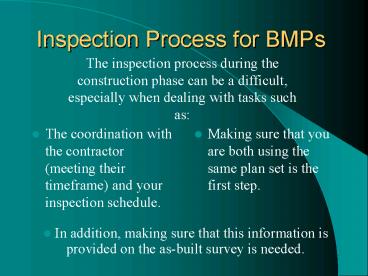Inspection Process for BMPs - PowerPoint PPT Presentation
1 / 27
Title:
Inspection Process for BMPs
Description:
... applicant to provide a photo journal documenting the proper ... Bank Stabilization. Sediment Removal. Wet/dry Basins- Fore Bays. Infiltration Trenches ... – PowerPoint PPT presentation
Number of Views:40
Avg rating:3.0/5.0
Title: Inspection Process for BMPs
1
Inspection Process for BMPs
The inspection process during the construction
phase can be a difficult, especially when dealing
with tasks such as
- The coordination with the contractor (meeting
their timeframe) and your inspection schedule.
- Making sure that you are both using the same plan
set is the first step.
- In addition, making sure that this information
is provided on the as-built survey is needed.
2
Inspection Process for BMPs
Inspection Process
- What specific BMP(s) is/are being installed?
- At what point during the construction will this
be installed?
- Is this BMP on the certified plan set?
- And is there a detail for this BMP?
Reminder Several of the most common BMPs that
deal with infiltration require non-compacted
soils and deep-rooted vegetation.
3
Inspection Process for BMPs
- Because of the difficulty of meeting time frames
and scheduling the County will be requiring, as
part of the as-built submittal process, the
applicant to provide a photo journal documenting
the proper installation of the specific BMP. - This requirement will be noted to the applicant
both during the review process and at the time of
certification.
4
Inspection Process for BMPs
- The Journal should/shall include items such as
- Photos of the BMP being installed
- When needed, documentation about the bedding
and/or backing material. - For those underground BMPs dimension of
structure and possibly manufacture specifics. - When installing underground manufactures item
provide proof of the delivery and pictures being
installed. - Information regarding soil compaction and the
type of vegetation being installed.
5
Inspection Process for BMPs(Cont.)
- This document will clearly state that before the
County will recommend the approval of the
as-built survey (this is part of the Countys
certificate of occupancy certification process)
and before a reduction/release of the posted
securities will be approved- this installation
journal will need to be submitted and approved.
6
As-Built Survey Process
As-Built Process
- During the Countys as-built review/inspection,
those BMPs at the surface (such as swales and
wet/dry ponds) will be inspected for the over
-all working condition (such as proper pitch,
erosion and stabilization. - Those located below ground/grade (such as
oil/grit separators and sediment collectors) will
be inspected by manhole covers and a visual
inspection inside (these are considered confined
space entry).
7
As-Built Survey Process
As-Built Process
- Checking the conditions of the inlet and outlet
stormlines-including debris removal. - Checking stabilization of the stormwater
facility- basin and slopes.
- Outlet structures (FESs) location BMP
(distance and time where water comes in and
leaves.) - Other devices that can be used going into the
facility to trap the 1st flush.
8
As-Built Survey Process
- The location, elevation and installation of the
restrictor. - The location, elevation and installation of the
overflow weir. - Verifying the top of berm height in relations to
the HWL and freeboard.
9
Routine Maintenance Needs
- As part of the overall maintenance the County is
considering retaining an additional portion of
the SW securities for possibly an additional
3-years or so, to ensure that the owner of the
BMP is doing the routine maintenance.
10
Routine Maintenance Needs
- Types of Maintenance
- Inspections
- Vegetation Management
- Debris/litter removal
- Mechanical Component Maintenance
- Pest Control
11
Routine Maintenance Needs
- Semi-Annual (annual inspections and after large
storm events). - Some of this can be inspected with the scheduling
mowing and trash removal.
12
Non-Routine Maintenance
Non-Routine Costs
- Name Sediment Removal
Life Expectancy - Wet Pond 5-10 years
20-50 years - Dry Pond
2-10 years 20-50 years - Grass Swale As needed
Indefinite - Infiltration Trench As needed
10 years - Sand Filter As needed 20-50
years - (6 months)
13
Non-Routine Maintenance
- De-thatch grass to remove accumulated sediment
and debris. - Aerate to promote infiltration.
- Replace BMP mechanical components.
- Reconstruct embankments and spillways.
14
Non-routine Maintenance Needs
- Pond Maintenance
- Bank Stabilization
- Sediment Removal
- Wet/dry Basins- Fore Bays
- Infiltration Trenches
15
Non-Routine Maintenance
Retrofit
- Create a wet or constructed wetland basin out of
a dry basin. - Stabilize shorelines and improve buffers.
- Replace turf grass with native vegetation.
16
Bioswale Plan
17
Bioswale
Drywell
18
Bad Drywells
19
Infiltration Trenches
20
Filter Strips
21
Parking Lot Filter Strip
22
Level Spreader
23
Porous Asphalt
24
Wet Pond
Dry Pond (Not good)
25
Oil/Grit Separator
26
In-Stream Sediment Collector
27
Seepage Pit































